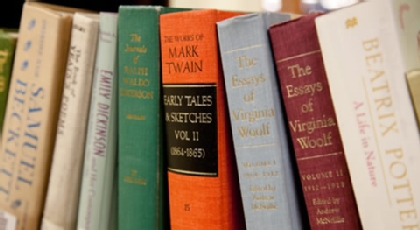Writers welcomed
During the summer, students in PLU’s Master in Fine Arts Creative Writing program gather on campus for their summer residency.
As part of the three-year program, the students meet four times for short summer residencies of about 10 days each.

Accomplished writers are not scarce in the program, but really, “The only requirement is to come as writers, published or not,” said Stan Rubin, MFA program director. (Photo by John Froschauer)
It’s a time to find guidance, let their writing breathe and listen to constructive criticism from their peers in a way that makes their work stronger.
“Our goal is a sustainable writing life,” said Stan Rubin, MFA program director.
Rubin said being a writer in the world with a sustainable writing career is what all of his adult students strive for, many of whom already have established writing success.
“The only requirement is to come as writers, published or not,” Rubin said.
Still, accomplished writers are not scarce in the MFA program. Rubin said many of the students admitted into the program have published, a few more than one book, and some even teach in other MFA programs themselves.
Rubin said the structure of PLU’s MFA program is unique in comparison with others around the nation, which is why it attracts students from 20 different states and Canada.
Third-year student Maddaline Enns is a 37-year-old mother of three from British Columbia. She said her youngest child was five months old when she began the program.
“They understand that people have other lives,” Enns said.
Enns’ story is a common one, since the median age of students in the MFA program is 44, Rubin said, and some students have even graduated in their 70s. He said the older crowd of students is no accident.
“You have to have lived in the world and have something to write about,” Rubin said.
Natalie Tilghman, a 30-year-old third year from Chicago, was drawn to the program because of the community that MFA faculty and peers had to offer.
“The community aspect is an interesting and innovative piece of the program,” Tilghman said. “There’s a great energy in it.”
Part of the innovative community aspect that impressed Tilghman was the required outside experience that students must complete during their second year.
The MFA outside experience allows students to remove themselves from everyday life and “be the writer,” Rubin said. Others develop a community-based experience that enriches their writing lives.
Tilghman’s outside experience was at the American Academy in Rome, where she studied her writing alongside composers, artists and other writers.
“It was a really rich environment,” she said. “If it hadn’t been for this program I wouldn’t have had this opportunity.”
Students come into the MFA program with specific needs, and there is an independent focus on the specific needs of each student. Rubin said students are assigned a personal mentor, who helps them develop their craft throughout the entirety of the sequence.
“The degree isn’t merely a prize for jumping through academic hoops,,” Rubin said. “The program is collaborative and process oriented throughout.. It’s very personal.”
Rick Dakan is a recent graduate of the program from Sarasota, Fla. The 38-year-old fiction writer focuses on a specific genre with a “mixed media element.” He had published two novels before admission into the program and published two novels during his studies.
“It really is exciting to see that chance to pause and reflect on the craft of (writing) and have the knowledgeable support of people who can point out deficiencies in my writing that I didn’t see before,” Dakan said. “I’ve definitely seen great improvement in the last three years.”
Although many of the students in the MFA program are accomplished, published writers, Rubin said there is a very “noncompetitive atmosphere.”
“You’re not on a ladder,” he said.
Rubin said a lot about the PLU culture attracted this program to campus. The nationally renowned program graduated its first full class in 2007. Despite the program’s youth, many of the students have won awards, gained national recognition, and published poems, stories, essays and books.


